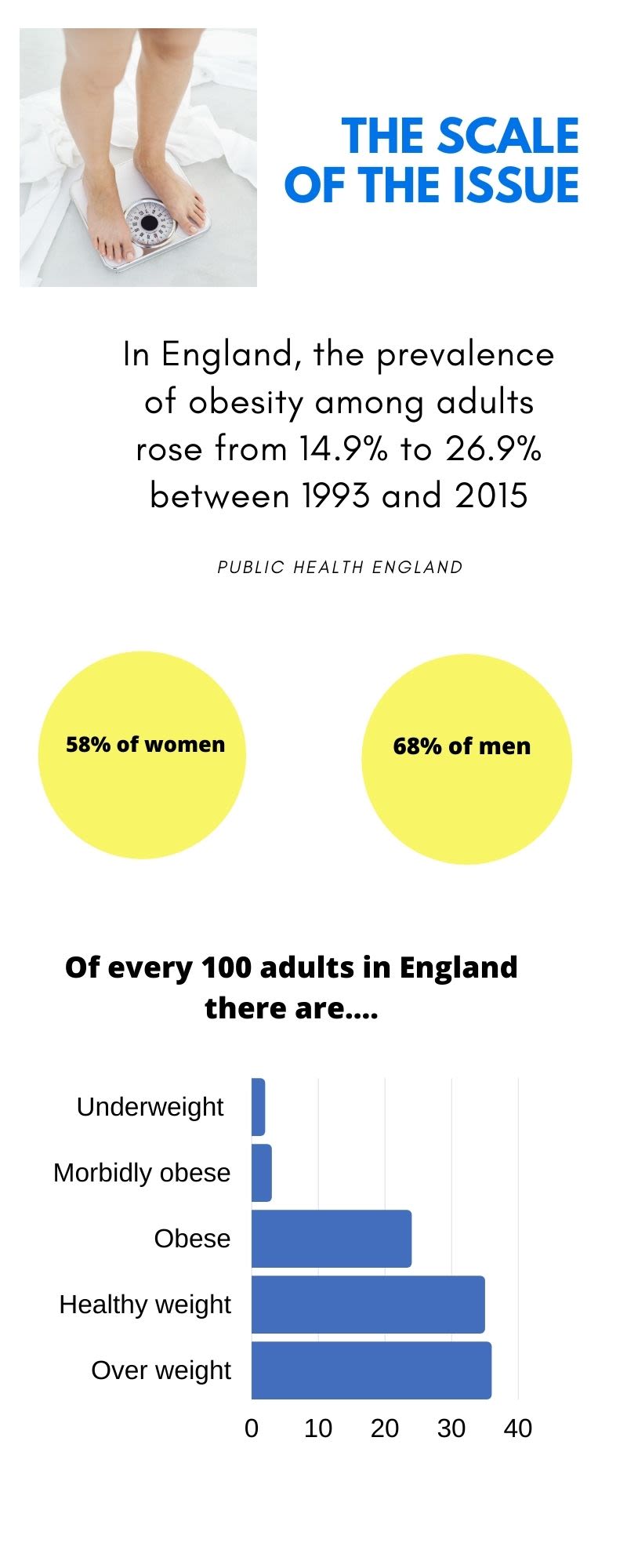Britain's obesity paradox
The cultural history and driving factors of obesity in the UK

“Watch out fat families! It’s time to get off your wobbly bums and melt that lard!”
This was the introductory rallying cry of the show's host at the beginning of each episode of the TV show Fat Families, which first aired in 2010.
‘Fat Families’ was presented by weight loss expert Steve Miller, who, in the introduction of each programme, would be seen dragging food out of people’s hands and tipping a family off of a sofa as they ate their dinner before cutting to someone smashing a cake with their fist. The late 90's and 2000's saw an increase in similar reality TV programmes which saw contestants who wanted to change how they looked being placed in the hands of a 'tough love' host who would make them rethink their lifestyle. Ten years after Fat Families first aired, obesity levels have increased in the UK with the Conservative Government introducing another strategy vowing to address it.

LATE 90’s - 2000’s TELEVISION AND BLAIRISM: SHAMING THE NATION
In October 2007, the Labour Government commissioned a report containing guidance from around 300 experts mapping out more than 100 psychological and socio-economic drivers of obesity.
The 2007 Tackling Obesities: Future Choices Report was one of a number of obesity strategies launched by successive UK governments since the 1990’s.
Nearly thirteen years later, the Conservative Party launched the Tackling obesity: empowering adults and children to live healthier lives report, which some food behavioural and eating disorder experts have condemned as an unsubstantiated tick box exercise which could cause more harm than good. With some asking why this Government chose to ignore almost everything in the detailed 164-page 2007 report?

THE OBESITY PARADOX
Among the critics of the Government’s latest obesity strategy is Thomas Midgley, a behavioural and cognitive psychotherapist and a highly specialised eating disorders dietitian with the British Dietetic Association (BDA).
For more than 15-years Midgley has predominantly been working in the fields of Eating Disorders, Personality Disorder and Complex Trauma as well as treating those with disturbed body image and low self esteem.
Keen to stress that while the strategy touches on important issues, such as tackling the food advertising industry, Midgley said he was taken aback by the strategy’s lack of detail and vision adding that it is based on principles which have been proven not to work and could be extremely harmful.
When you compare the newly launched NHS 12-week calorie counting weight loss app to the 2007 report which looked ahead to 2050, the latest strategy feels lacking in any visionary heft.
“The government's [NHS weight-loss] app is based almost entirely on principles such as calorie counting which we know doesn't work. Aside from the fact that none of it attempts to factor in critical issues such as the poverty and socio-economic traps which we know are major drivers of eating disorders such as binge and comfort eating,” said Midgley.
Binge eating is an eating disorder which sees a person consume up to three to five thousand calories in about half an hour and is usually followed by feelings of shame, whereas comfort eating occurs when a person consumes hundreds of calories at a slower pace while watching TV, for example.
Midgley claims the strategy risks an increased number of people falling prey to what he describes as the Obesity Paradox, which occurs when someone falls into the cycle of gaining self-esteem from goal setting and losing weight. But once the weight-loss stops, they revert back to seeking comfort from old eating habits.
Britain’s hostility towards obesity and the west’s changing ideas of what ‘fatness’ represents can be dated back to when the gradual disenchantment with corpulent bodies began more than 500 hundred years ago.

But in recent times, much of people's attitudes, including politicians and health professionals, can be traced back to the more modern ‘body image ideal’, from the curvy ‘Marilyn Monroe’ figure of the 1950’s to the much sought after thin athletic physique of the 1970’s.
In addition to that, the introduction of Ultra-processed foods (which now make up half the calories consumed in the UK and US) a multibillion-pound food and diet industry along with increasing social inequalities exacerbated by crippling austerity, have culminated into the high levels of obesity and eating disorders we see today.
Phoebe Jameson (18) is a UK based body positivity activist and founder of The Speak Up Space who also speaks about body-shaming on her Instagram account.
Phoebe said she noticed a sharp increase in the amount of online abuse she got after the strategy was announced.
She said: "Why people feel they have the right to comment on other people's bodies when they know nothing about them or their health is incredibly frustrating and at times very hurtful. This strategy is almost guaranteeing that a large portion of the next generation have eating disorders."


A year after the Labour Government’s expansive 2007 strategy, the first episode of Supersize v Superskinny aired on our screens.
Fronted by Dr Christian Jessen, from 2008 to 2014, the show documented both overweight and underweight people who were desperate to change their bodies.
Typical tropes in the show included throwing the weekly food intake of each contestant down a clear tube for Dr Jessen to dissect as the contestant meekly stood by - usually in their underwear.
Then the two contestants would swap their eating routines - which would see the “Supersize” try to survive an entire day on one cereal bar and the “Super skinny” attempt to get through an entire pizza, burger and chips in one sitting.

"One of the dangers of this strategy is it buys into all of the damaging clichés developed during the 70s and 80s which shames obesity." said Thomas Midgley

Another critic of the strategy is Emily Bashforth, a 21-year-old blogger living in the UK who has suffered from eating disorders for as long as she can remember and became obsessed with thinness at a young age, she said: “I really worry that this debate will cause relapses in those with eating disorders. And if children are being sent messages that obesity should be demonised and calories are things to keep track of, then the cycle of kids growing up with disordered eating and hating their bodies will never end.”

Ultra-processed foods and the 'hunger' hormone
Ultra-processed foods are one of the most serious threats to people's health, according to Dr Alex Richardson who founded the UK-based research charity Food and Behaviour Research and is a senior research fellow at Oxford University
. Dr Richardson has researched the possible links between diet and brain health, mood and behavioural conditions.
“As long as Ultra-processed foods still make up as much as half of the food people eat in then we are all in big trouble,” she said.
“Eating too much processed sugary foods results in a resistance to immunity which we know leads to type 2 Diabetes, but what many are not aware of is that once you become resistant to insulin, the next thing to happen is you become resistant to leptin and once this happens, you are in real trouble. And so the cycle continues,” added Dr Richardson.
Leptin is a hormone designed to inhibit appetite, to stimulate the burning up of fatty acids, decrease glucose, and reduce overall body fat and weight.
Possible actions the government could take according to Dr Richardson and Mr Midgley include taxing high-processed foods and then subsidising fruit and vegetables. However, both agreed that this was a very small step in taking on the monumental socio-economic and psychological factors linked eating disorders.

‘If one were forced to come up with a six-word explanation for the otherwise inexplicable ferocity of America’s war on fat,’ Paul Campos writes in The Obesity Myth, ‘it would be this: Americans think being fat is disgusting. It really is, on the most important cultural and political levels, as simple as that.’ he writes.
In Christopher E Forth’s book ‘Fat: A Cultural History of this Stuff of Life’, he explores two themes which emerge from his research: “How people have viewed and judged corpulent bodies over the centuries and how fat - as both a substance and a description of body size - has been associated with vitality and fertility as well as perceptions of animality.”
According to Forth, many scholars conclude that the west's current anti-fat stereotyping is a modern phenomenon which has been developing in fits and starts since the 1500s becoming more pronounced since the 1920s.
When speaking about how being considered fat is viewed today, Forth writes: “Understood literally or figuratively, ‘trimming the fat’ is a core tenet of neoliberalism, a now widely entrenched political and economic theory that emphasises individualism and free enterprise as keys to human well-being.”
French sociologists see this technocratic world as striving to be more dégraissé- literally ‘degreased’ or ‘defatted’.

Deanne Jade, a psychologist and founder of the National Centre for Eating Disorders and has worked with those with eating and weight problems for 35-years takes a more sympathetic view on the strategy.
"Over and over again, one government after another - and I am not blaming Boris here - target what is immediately accessible, which is peoples diet. But as we know, the reasons behind why people lose weight is much much deeper.
"While I do understand the panic the government may be feeling, unfortunately fear and shame are not useful strategies. If I had the answer to the problem I would tell you. I have been working in this area for 35-years and I can tell you that there is not one simple answer."
Similarly to Jade, Thomas Midgley suggests a complete overhaul in society's approach to wellness.
Midgley said: "People need to stop focusing solely on weight and food. In order to tackle this issue, we need a holistic, compassionate approach to wellness in society as a whole- and until that is done, these kind of strategies are almost certainly doomed to fail."
